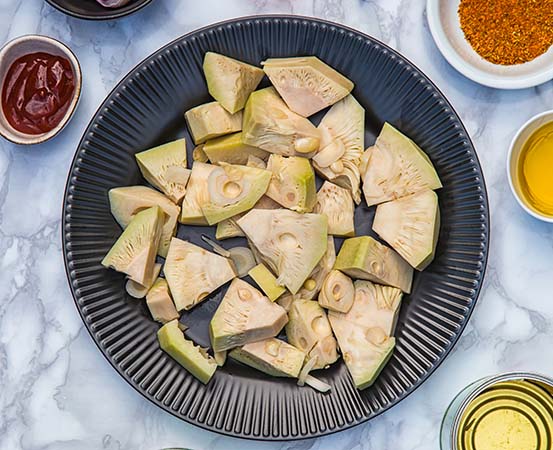
Diabetes need not stop you from relishing jackfruit. However, just like the mango, this exotic fruit should also be eaten with some precaution to ensure that it doesn’t scuttle your diabetes management plan. People with diabetes can have raw jackfruit, but when it comes to ripe jackfruit, then it should be had only under strict moderation. Jackfruit infused sweets, jams and ice-creams should be kept miles away from them.
Rinki Kumari, chief dietician at Fortis Hospital, Cunningham Road, Bengaluru, feels that consuming raw jackfruit in the right quantity could be beneficial for diabetics, as it has a low glycemic index (GI) value (50–60 on a scale of 100) besides being rich in fibre, vitamins and minerals.
Kaul recommends jackfruit to diabetics only as part of a balanced meal, and stresses the importance of considering its carbohydrate content within the overall carbohydrate allowance for the day. Diabetics should consult their dietician to determine their daily carbohydrate intake.
Health benefits of jackfruit
Experts point out that jackfruit is a treasure trove of nutrients that help improve heart health, digestion and immunity.
Kaul says that the antioxidants present in jackfruit help reduce oxidative stress and inflammation. “Managing oxidative stress is important for diabetics, as they are more prone to complications related to free radicals and inflammation,” she explains.
She adds that raw jackfruit is even better for people with diabetes to manage their blood sugar levels. “The fibre content slows down the absorption of sugar and prevents rapid spikes in blood glucose levels after meals,” adds Kaul. It is also a very filling food and prevents overeating in most people.
Bengaluru-based dietitian Deepalekha Banerjee says that jackfruit, which doubles up as a vegetable when it’s unripe, contains some great nutrients. “Manganese present in it helps in improving brain functioning while antioxidants and carotenoids [natural pigments] help reduce chronic complications like cardiovascular conditions and certain types of cancer,” explains Banerjee. It also promotes healthy skin and good eyesight.
Jackfruit is a good source of vitamin C, which supports immune function and collagen synthesis. It is also good for overall digestive health and promotes bowel regularity.
“It also helps in blood pressure management, as the potassium present in it can counterbalance the effects of sodium and support cardiovascular health,” adds Kaul.
How much jackfruit can diabetics consume?
Banerjee says diabetics shouldn’t have more than 100 grams of ripe jackfruit a day. “In addition, carbohydrates or sugar content from other meals need to be lowered while consuming jackfruit,” she adds.
“Uncontrolled consumption of ripe jackfruit without reducing the carb and sugar content for the rest of the day can increase blood glucose levels,” cautions Banerjee.
Kaul recommends monitoring blood sugar levels after consuming jackfruit and observing how it affects your body.
Impact on metabolism and insulin sensitivity
Kaul points out that the GI value of jackfruit can vary depending on its ripeness, while its effect depends on the health of the person consuming it. “Blood sugar levels can vary from person to person, while factors like individual metabolism, insulin sensitivity and overall composition of the meal can influence how ripe jackfruit affects blood sugar levels,” explains Kaul.
According to Banerjee, people with uncontrolled blood sugar levels should opt for raw jackfruit instead of a ripe one.
Several ways of eating jackfruit
There are various ways diabetics can consume jackfruit for its benefits. Experts opine they can snack on the ripe fruit, provided they monitor the portion sizes. “Aim for moderate portions, such as incorporating half to one cup of sliced or diced jackfruit into your overall carbohydrate allowance for the meal or snack,” suggests Kaul.
People can also make a smoothie out of it by blending it with low-glycemic index fruits, such as berries or avocado. “Greek yogurt can also be added to include protein,” adds Kaul.
Besides having it in the form of curries or stir fries, you can also incorporate it into your salad along with leafy greens, vegetables, lean proteins and healthy fats (like nuts or seeds).
“Unripe jackfruit has a neutral taste and a meat-like texture, which makes it a suitable plant-based alternative for meat,” says Kaul. She recommends pairing it with other low-glycemic index vegetables, lean proteins and whole grains for a balanced and satisfying meal.
Who should avoid jackfruit?
Some people might turn out to be allergic to jackfruit. “If you have a known allergy to birch pollen, latex or other fruits in the same family [like kiwi and avocado], you may be at a higher risk of developing an allergic reaction to jackfruit,” warns Kaul.
Sometimes, raw jackfruit may also cause gastrointestinal issues (like bloating or gas) in some people.
Kumari cautions, “People with certain medical conditions [like kidney complications] or on certain medications should consult a healthcare provider before consuming jackfruit.”
Takeaways
- Jackfruit, which doubles up as a vegetable when it’s unripe, can be consumed by diabetics in moderation.
- Jackfruit is a rich source of several nutrients that help improve heart health, digestion and immunity.
- The amount of jackfruit that a diabetic can consume depends on his/her dietary requirements, blood sugar levels and overall carbohydrate intake.
















